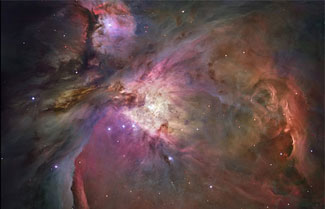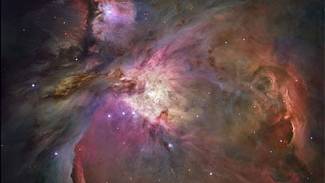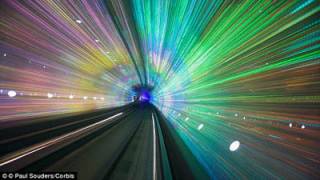Quantum physics: It's all about me, me, me, isn't it?
Source: usatoday.com
 Biologists and other scientists have long expressed amusement, and gritted their teeth, when they encounter the persistent contention by particle physicists that they alone pursue science in its most pure state. "Particle physics is the most fundamental area of science in that its goal is to reduce the wonderful diversity and complexity of our universe to a few simple mathematical laws," wrote the noted physicists Sylvester James Gates, Jr. and Warren Siegel, two decades ago, expressing a truism often shared by those in their discipline.
Biologists and other scientists have long expressed amusement, and gritted their teeth, when they encounter the persistent contention by particle physicists that they alone pursue science in its most pure state. "Particle physics is the most fundamental area of science in that its goal is to reduce the wonderful diversity and complexity of our universe to a few simple mathematical laws," wrote the noted physicists Sylvester James Gates, Jr. and Warren Siegel, two decades ago, expressing a truism often shared by those in their discipline.What's worse for the long-suffering biologists, physics has long started reaching into others' fields, spawning disciplines such as biophysics, and even taken on subjects such as sociology, the far reaches of messy "soft" sciences.
But maybe the physicists have it backwards, suggests one well-known biologist, embryonic stem cell scientist Robert Lanza of Advanced Cell Technology, writing in the current issue of The American Scholar, a quarterly brought to you by the folks at Phi Beta Kappa. Maybe the world is the product of one aspect of biology, the mind, and not the other way around, he argues. "As we have seen, the world appears to be designed for life not just at the microscopic scale of the atom, but at the level of the universe itself," Lanza writes. What if, Lanza asks, this means that instead of infinitesimally tiny particles creating space and time (and making life possible), "the brain can really create physical reality."
Lanza, who is best known as one of the scientists behind a 2001 attempt to clone human embryonic stem cells, calls this theory "biocentrism" and in the article he points to the well-known weirdness of quantum mechanics, the basic rules of particle physics, to make his case. Observations of particles at the sub-atomic scale, the "quantum" world, show they often exhibit odd properties such as the seeming ability to be in many places at once. Einstein and a few other physicists have long complained that such weird behavior seems unlikely to be what is really going on at these very small scales. Even the famously down-to-earth physicist Richard Feynman agreed that there was something fundamentally strange about quantum mechanics, Lanza notes.
A few others have taken this complaint further, arguing that the actual observations that physicists make of these particles are the things fixing their position. Lanza goes quite a bit beyond even that position, arguing that quantum weirdness means that space and time are purely mental creations, crafted by everyone making observations all the time. "The entities we observe are floating in a field of mind that is not limited by an external spacetime," he writes.
Therefore, the most truly fundamental scientific question, argues Lanza, is not what sort of particles or strings underlie our reality, but the neouroscientific one of how we can be conscious. Biologists are only now beginning to plumb such questions, a project that Gerald Rubin, research chief of the just-opened Janelia Farms complex in Ashburn, Va., part of the Howard Hughes Medical Institute, estimated would be a century-long research endeavor.
Thinking we somehow create the world with our thought, of course, is a philosophy with long roots, Lanza acknowledges, notably solipsism, the belief that one is at the center of all things in the world, and the English philosopher Bishop Berkeley's 1700's-era sermons on the non-existence of matter (Samuel Johnson famously said, "I refute it thus," kicking a rock.)
And physicists have heard this line of reasoning before, says astrophysicist and science writer David Lindley, author of the just-released Uncertainty: Einstein, Heisenberg, Bohr, and the Struggle for the Soul of Science. "This view has had some supporters over the years, but it's always been an odd attitude, and today is not taken seriously."
"Lanza says that our consciousness creates reality – but to do so, our perceptions have to bounce off something, so to speak. We have to conclude that there's something out there that our brains are interacting with, and that something has to be pretty much the same for all us, so that we all "construct" a similar-looking reality. In other words, something outside of us, independent of us, still has to exist," Lindley says.
"That something, I would argue, is the quantum version of reality, which as Feynman and others agree is a weird thing to understand. But the fact that it's weird doesn't mean it's fictitious."
"Biology is at first glance an unlikely source for a new theory of the universe," Lanza acknowledges in the article. But, "we need a revolution in our understanding of science and of the world." he says, adding that he hopes to expand the article into a book on biocentrism. So, the disagreement will likely continue.
"I can't help thinking that there's an enormous exercise of vanity in Lanza's argument — the universe only exists, he says, because we're here to observe it and be part of it," Lindley says in objection. "I would go the opposite extreme. I think the universe was a real physical thing long before we came on the scene, and we humans are just crumbs of organic matter clinging to the surface of one tiny rock. Cosmically, we are no more significant than mold on a shower curtain."
Each week, USA TODAY's Dan Vergano combs scholarly journals to present the Science Snapshot, a brief summary of some of the latest findings in scientific research. For past articles, visit this index page.
Article from: http://www.usatoday.com/tech/science/columnist/
vergano/2007-03-11-quantum-quandary_N.htm






















